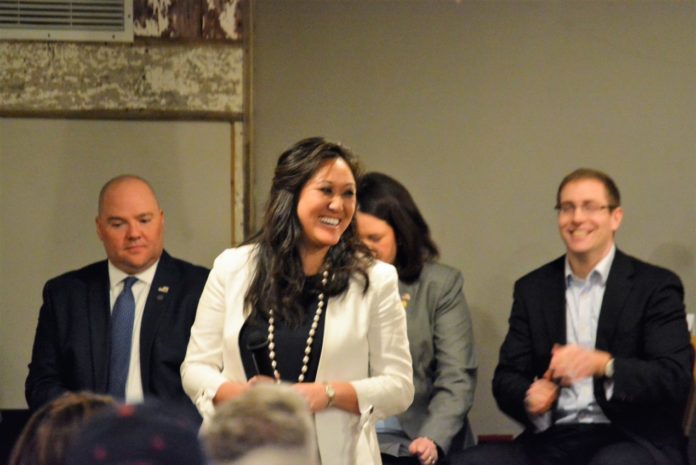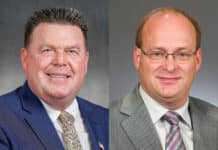MINNEAPOLIS, Minn — Former Minnesota State Senate candidate and small business owner Jennifer Carnahan seeks to become the next State Chair of the Republican Party. Delegates at the GOP State Central Committee Meeting in April will elect someone to replace current chair, Keith Downey.
Carnahan is a strategist. Her many years working for some of the biggest names in corporate America has left her fearless.
Soon after she announced her decision to run for State Party Chair, Carnahan developed a 39-page plan for how she would turn the Party around. You can view the plan here. Carnahan is incredibly confident. Despite being considered a political novice – only attending her first caucus as a Senate candidate in 2016, she relies on her world experience to propel her to the next level. However, she is grounded in her confidence, reflecting on wisdom shared by loved ones as a means of moving forward.
Carnahan has an infectious personality, causing people to gravitate towards her. Her determination and resilience makes her a viable contender for State Party Chair despite her age and political experience.
Alpha News MN has introduced you to each of the candidates for Chair. We asked them to answer a list of questions about their ideas for the future of the GOP. This is how candidate Jennifer Carnahan responded.
You’ve had an interesting career. You’re very accomplished for someone so young. You’ve worked for national sports teams, you’ve been courted by some of the biggest names in the business industry, and you’ve been a relatively successful candidate. Now you’re a small business owner. How does your experience prepare you for State Party Chair?
“My diverse experiences – professionally, politically, and personally, prepare me excellently for Chair because I’ve had so many opportunities in life where I’ve had to work with, in different types of organizations, learn to work collaboratively with different types of personalities or different companies. The business and political experience sets me up perfectly to lead the Party moving forward because I bring in such an eclectic mix and I’m not just coming from someone who has followed just one path their whole life. As an outsider looking in before I got involved, I think there’s a huge opportunity for the party with messaging and strategy and approaching it from an organized, directed, plan-full way, than just trying to get candidates elected just here or there. That’s my biggest strength because of my corporate career where I’ve spent 15 years climbing the corporate ladder, where I had to lead complex, matrix organizations where you’re trying to sell a plan or a product across an entire country or in some cases the globe. Voters are different segments. You have to build authentic and emotional connections. You have to build a plan around that.”
You’re the youngest candidate running for this position. You attended your first caucus in 2016. There are some people who might see you as too young or politically inexperienced to lead a Statewide Party and make Minnesota a competitor. What do you say to your detractors?
“I think that is a huge mistake. I think it’s a bit short-sided. I may not have decades of political experience. What I bring with me is 20 years of strong business and life experience. Everything we need to do in this party is no different than what I did in corporate America. When I think about the companies I worked for, at EcoLab, we were a $13B company and I was in charge of overseeing a $120M business unit with about 400 employees. I had a responsibility to lead and direct to achieve our business unit goals. If a Fortune 500 company has the confidence in me to put me in a role like that at the age of 35, that experience could easily roll over into the political party. I hope people can look beyond age. Theo Epstein was named General Manager of the Boston Red Sox at the age of 28 years old. I mean that’s very young and he went on to win a World Series there. Placing someone into a box because of their age is wrong. My parents say this to me a lot. You have more life experience than a lot of 80 year olds. I’m not afraid to take on challenges and risks, to push outside the box and get outside the comfort zone. That is exactly what the Party needs.”
In a recent MinnPost article, you mentioned the Party needs to gravitate away from the old, white, 60 year-old man. Do you think this identity politics is what Republicans need in order to compete with Democrats?
“So I think that article took the conversations I had with the reporter a bit out of context. The identity politics piece, how that was represented is not how the conversation took place. I was asked about being a Korean and female and if that’s identity politics. I think my response was, if being a Korean female is identity politics then it’s too bad because I can’t change. I cannot rip off my face and put on blonde hair and blue eyes. I am a Korean female and that is what it is. Regarding the white, 60 year-old male, the context in which that comment was made is there is an opportunity for us [Republicans] to expand their base and that means being open minded to everybody. It doesn’t matter who they are or what they look like. There’s a huge opportunity for us to usher in the next generation. Younger people, millennials, into the Republican Party and if you look at the Party overall, not just in Minnesota, that is something Republicans have struggled with. Throughout my campaign in Minneapolis and talking to people, I was able to build authentic connections and build in-roads into different organizations and groups and demographics of people by getting out and talking.”
Despite Minnesota coming as close as it has been in the last 30 years to voting Republican in a presidential race, Stewart Mills lost the eighth and many local candidates did much better than Trump in their districts. Do you think there was a Trump wave?
“Absolutely. If you look at the 8th Congressional District, I think that was one of the districts in the entire U.S. that swung the most for Trump on the presidential ballot. As you mention Stewart Mills did not get across the finish line. You have to look, did people jump the ticket? Trump is a unique brand and personality. He brought a lot of people that weren’t here. So the question is are those people Republican or did they just vote that way out of anger and frustration? Can we count of their vote in 2018 when it gets to these constitutional offices and congressional races? We cannot take any of that for granted. We cannot assume that our base just grew. I think we need to work harder than we did in 2016 and make sure, starting now that we are setting our party up for success.”
Should you be elected, you face a very tough road ahead. You have a party that has over $1 million in debt, a skeleton staff, a remarkable statewide win you’ll be expected to replicate in 2018, and just two years to run effective campaigns for mayoral races in Minneapolis/St. Paul, a U.S. Senate race, eight Congressional races, State Representative races, statewide constitutional races, a Governor’s race, and a potential special election. Where do you begin?
“I think that’s a great thing. I’ve already built a 40-page strategic plan that outlines, if I’m elected on April 29, what I’ll start to do the next day. So that plan talks about five core areas. Getting people elected, so deploying different strategies between the metro part of the Twin Cities and Greater Minnesota. There’s a fundraising plan in there that talks about reducing the debt and increasing the fundraising that comes into the Party. Working continually across the GOP enterprise, strengthening the brand and maintaining strong operations. To me, that doesn’t seem like a daunting or scary task because I’ve been put into way more difficult situations in corporate America where you are accountable at the same level to shareholders as a publically traded company and have to sit in front of an executive C-Suite team once a quarter and give a presentation on my results when I’ve had a very short time to turn things around. To me, this is a challenge that with the right plan, like the one I’ve put together, I think it might not seem as daunting as it sounds maybe on paper.”
On April 29, Republican delegates will travel to St. Cloud, Minn to vote for one of the four MNGOP State Chair candidates.

















